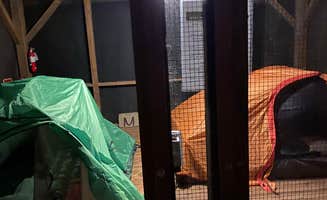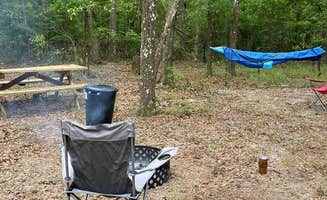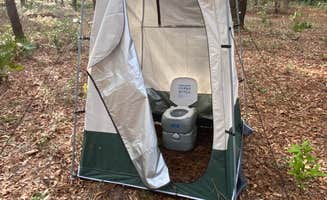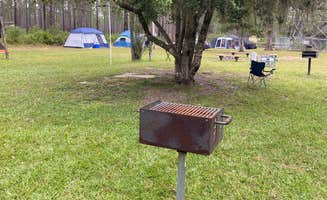Tent campsites near White Springs, Florida center around the Suwannee River Wilderness Trail system, where water levels fluctuate seasonally and can significantly impact camping conditions. Located in north Florida's rural landscape, these sites typically experience mild winters with temperatures between 40-70°F and hot, humid summers that frequently include afternoon thunderstorms. During summer months, paddlers should plan morning travel to avoid daily storms that typically arrive between 2-4pm.
What to do
Swimming at natural springs: Lafayette Blue Springs State Park offers a limestone bridge that swimmers can snorkel under, with year-round 72-degree water temperature. As one visitor noted, "Beautiful spring for swimming featuring a limestone bridge way you can snorkel under. If you're into diving they also have an underwater cave, just make sure to check in with the ranger station 2 miles north before diving."
Fishing along the Suwannee: Bowman's Landing provides direct river access for anglers. A camper shared, "My daughter says her favorite part was fishing and swimming in the river." The campground sits upstream from the Ichetucknee River, offering multiple fishing spots.
Paddling between camps: Plan multi-day kayak or canoe trips using the river camp system. A paddler who completed a 65-mile journey explained, "We did a 65 mile paddle on the Suwanee River and stayed at two river camps and a campsite! We loved all the spots. These river camps are a TREAT!"
Wildlife observation: Watch for nocturnal animals around camping areas after dark. Many sites have resident wildlife including raccoons and occasional bears. Birders should listen for Chuck-will's-widow and owls, particularly during spring and summer evenings.
What campers like
Screened sleeping platforms: Holton Creek River Camp offers platforms with electricity and ceiling fans. A satisfied camper stated, "The platforms are amazing. Power, fire ring, and running water. Hot showers also." These platforms typically accommodate 6-8 people.
Convenient transport systems: Most river camps provide wheelbarrows to move gear from the river to campsites. One paddler appreciated this feature at Dowling Park: "Wheelbarrows to wheel your stuff from the river to campsite. Amazing!"
Clean bathhouses: Facilities at most river camps include hot showers and toilets. A Woods Ferry visitor mentioned, "The bathrooms are nice," while another at Lafayette Blue Springs noted, "Super clean bathrooms and an outdoor rinsing station/shower."
Communal spaces: Woods Ferry River Camp provides shared areas for larger groups. A camper reported, "The campsite has a large shelter with a large campfire ring and seats for bigger parties." These communal areas typically include picnic tables and fire rings.
What you should know
Seasonal water level changes: River access can be challenging during high water periods. A paddler noted at Woods Ferry, "At high water you will be able to paddle up walkway to get out. Please turn boat to side of railing and secure as far up ramp as possible to leave room for others coming in."
Campsite reservation systems: While historically first-come-first-served, reservation requirements may change. Check ahead for current policies, especially for group camping. Many outfitters can assist with reservations.
Limited road access: Most river camps are water-access only. An experienced camper explained, "You cannot drive into Woods Ferry, this is a river access location only, except for camp hosts and permitted outfitters."
Insect preparation: Summer brings heavy bug activity. A camper at Peacock Slough River Camp observed, "Wintertime is fantastic here as the bugs are at bay." Bring appropriate repellent for summer visits.
Cell service limitations: Connectivity is spotty along the river corridor. At East Tower Hunt Camp, "There is no cell service," according to a visitor. Important communications should be handled before departing or at designated locations with service.
Tips for camping with families
Bicycle-friendly options: Some campgrounds provide recreational equipment. At Bowman's Landing, a parent shared, "My son's favorite part was riding around on the provided bicycles and playing darts & cornhole by the communal fire pit."
Accessible water play: Choose sites with gentle river entry points for children. Lafayette Blue Springs offers "crystal clear spring water just steps away" from the tent camping area, making it ideal for families.
Educational opportunities: Dowling Park River Camp serves as an excellent starting point for group paddling trips. A leader noted, "This was our starting point for a 50 miler with a boy scout troop. Easy put in and take out." The river camps are approximately 10-12 miles apart, making manageable day segments for youth groups.
Security considerations: Keep food items secure from wildlife. Experienced campers advise, "Always take paddles, PFD's, fishing equipment, food items and valuables to your camping area - do not leave in boats."
Tips for RVers
Primitive sites for small rigs: Big Camp Hunt Camp accommodates smaller recreational vehicles. A visitor reported it as "Nice and secluded, great for overlanders. Only downfall is the mosquitos." Most hunt camps have minimal amenities but provide basic privacy.
Water and power considerations: Most river camps have electricity and water available at facilities, but not at individual RV sites. Prepare for self-contained camping with limited hookups.
Access road conditions: Forest service roads may have rough sections. Some dispersed camping areas require high-clearance vehicles to access safely, particularly after rain events.






